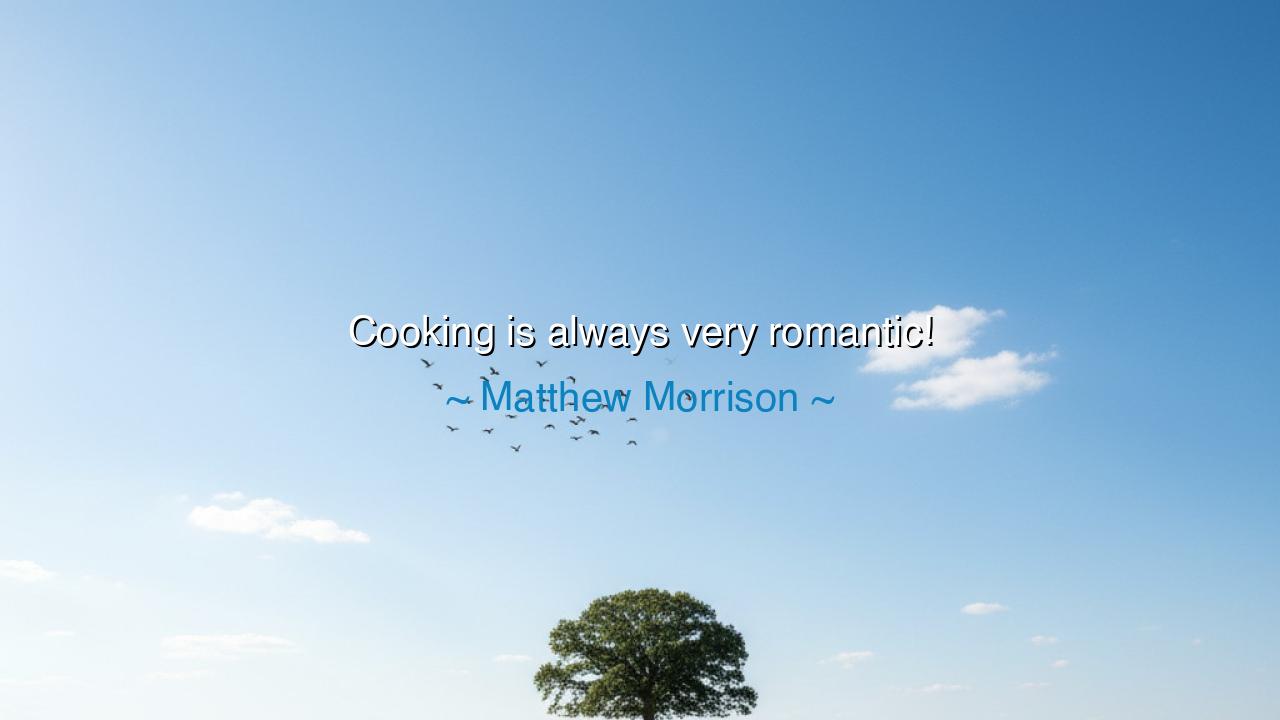
Cooking is always very romantic!






In the words of Matthew Morrison, “Cooking is always very romantic!” Though brief and simple, these words carry the fragrance of ancient wisdom, for to prepare food for another has always been more than a task of survival—it is a gesture of care, of intimacy, of devotion. The act of cooking unites the primal need of the body with the tender longing of the heart, and in this union, it becomes sacred. Thus Morrison reminds us that the hearth is not merely the place of fire, but the altar of love.
The ancients revered this truth. In every culture, the sharing of food was a sign of trust and affection. To break bread together was to seal friendship; to offer wine was to declare joy; to prepare a meal for the beloved was to whisper silently, “Your life is precious to me, and I will nourish it.” For what could be more romantic than saying, not with words, but with labor, “I desire your strength, your delight, your very survival”? Thus the gift of food has always been a gift of the self.
Consider the story of Odysseus returning to Ithaca after long years of war and wandering. Though battle-hardened, he found his peace not in conquest but in reunion with Penelope, in the quiet rituals of hearth and home. Imagine the meals shared between them after decades apart—the bread, the wine, the simple fruits of the land. These were not merely meals, but feasts of reconciliation, moments where love, weary from trial, was renewed at the table. Such moments prove Morrison’s words true: cooking is always romantic, because it carries within it the fire of intimacy and the promise of renewal.
The romantic nature of cooking lies also in its creativity. To prepare a dish is to craft an experience, to imagine what will delight the senses of another, to labor with hands and heart until nourishment becomes celebration. In this way, cooking is akin to poetry, but spoken in flavor instead of words. The beloved tastes, and in tasting, knows: “I was remembered, I was cherished, I was worth the effort.” Few gestures speak more powerfully of love.
Yet beyond intimacy, cooking carries the power of ritual. The gathering around the fire, the shared table, the act of feeding one another—these are timeless gestures of unity. In times of old, entire tribes were bound together by shared meals; in families today, the same truth remains. When two lovers cook together, they step into this eternal stream, becoming not only companions but co-creators of joy. Thus Morrison is correct: cooking is not sometimes romantic, but always, because it binds souls together through both effort and delight.
The lesson is clear: do not underestimate the power of small acts. A meal lovingly prepared can speak louder than eloquent speeches, for it satisfies both body and soul. To those who seek to kindle or rekindle love, the advice is simple—cook together, or cook for one another. In the fragrance rising from the pan, in the laughter over a mistake, in the warmth of a shared table, romance blossoms naturally, without pretense.
And what should you do? Make cooking a part of your love story. Learn a favorite dish of your beloved and prepare it as a gift. Set aside time to cook side by side, turning the ordinary act of nourishment into a sacred ritual of companionship. Remember that in every stir of the spoon, in every taste shared, you are saying what words cannot: “I love you, and I wish to keep you well.” For this is the eternal wisdom of the hearth—that love is most deeply proven not in speeches or jewels, but in the daily bread shared between two souls.






AAdministratorAdministrator
Welcome, honored guests. Please leave a comment, we will respond soon